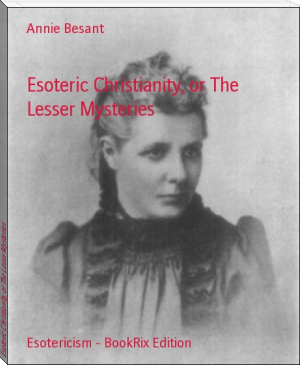Esoteric Christianity, or The Lesser Mysteries - Annie Besant (ebook reader that looks like a book .TXT) 📗

- Author: Annie Besant
Book online «Esoteric Christianity, or The Lesser Mysteries - Annie Besant (ebook reader that looks like a book .TXT) 📗». Author Annie Besant
This highest form of prayer in Class B merges almost imperceptibly into Class C, where prayer loses its petitionary character, and becomes either a meditation on, or a worship of, God. Meditation is the steady quiet fixing of the mind on God, whereby the lower mind is stilled and presently left vacant, so that the Spirit, escaping from it, rises into contemplation of the divine Perfection, and reflects within himself the divine Image. "Meditation is silent or _unuttered_ prayer, or as Plato expressed it: 'the ardent turning of the Soul towards the Divine; not to ask any particular good (as in the common meaning of prayer), but for good itself, for the Universal Supreme Good.'"[305]
This is the prayer that, by thus liberating the Spirit, is the means of union between man and God. By the working of the laws of thought a man becomes that which he thinks, and when he meditates on the divine perfections he gradually reproduces in himself that on which his mind is fixed. Such a mind, shaped to the higher and not the lower, cannot bind the Spirit, and the freed Spirit leaping upward to his source, prayer is lost in union and separateness is left behind.
Worship also, the rapt adoration from which all petition is absent, and which seeks to pour itself forth in sheer love of the Perfect, dimly sensed, is a means--the easiest means--of union with God. In this the consciousness, limited by the brain, contemplates in mute exstasy the Image it creates of Him whom it knows to be beyond imagining, and oft, rapt by the intensity of his love beyond the limits of the intellect, the man as a free Spirit soars upwards into realms where these limits are transcended, and feels and knows far more than on his return he can tell in words or clothe in form.
Thus the Mystic gazes on the Beatific Vision; thus the Sage rests in the calm of the Wisdom that is beyond knowledge; thus the Saint reaches the purity wherein God is seen. Such prayer irradiates the worshipper, and from the mount of such high communion descending to the plains of earth, the very face of flesh shines with supernal glory, translucent to the flame that burns within. Happy they who know the reality which no words may convey to those who know it not. Those whose eyes have seen "the King in His beauty"[306] will remember, and they will understand.
When prayer is thus understood, its perennial necessity for all who believe in religion will be patent, and we see why its practice has been so much advocated by all who study the higher life. For the student of the Lesser Mysteries prayer should be of the kinds grouped under Class B, and he should endeavour to rise to the pure meditation and worship of the last class, eschewing altogether the lower kinds. For him the teaching of Iamblichus on this subject is useful. Iamblichus says that prayers "produce an indissoluble and sacred communion with the Gods," and then proceeds to give some interesting details on prayer, as considered by the practical Occultist. "For this is of itself a thing worthy to be known, and renders more perfect the science concerning the Gods. I say, therefore, that the first species of prayer is Collective; and that it is also the leader of contact with, and a knowledge of, divinity. The second species is the bond of concordant Communion, calling forth, prior to the energy of speech, the gifts imparted by the Gods, and perfecting the whole of our operations prior to our intellectual conceptions. And the third and most perfect species of prayer is the seal of ineffable Union with the divinities, in whom it establishes all the power and authority of prayer; and thus causes the soul to repose in the Gods, as in a never failing port. But from these three terms, in which all the divine measures are contained, suppliant adoration not only conciliates to us the friendship of the Gods, but supernally extends to us three fruits, being as it were three Hesperian apples of gold. The first of these pertains to illumination; the second to a communion of operation; but through the energy of the third we receive a perfect plenitude of divine fire.... No operation, however, in sacred concerns, can succeed without the intervention of prayer. Lastly, the continual exercise of prayer nourishes the vigour of our intellect, and renders the receptacle of the soul far more capacious for the communications of the Gods. It likewise is the divine key, which opens to men the penetralia of the Gods; accustoms us to the splendid rivers of supernal light; in a short time perfects our inmost recesses, and disposes them for the ineffable embrace and contact of the Gods; and does not desist till it raises us to the summit of all. It also gradually and silently draws upward the manners of our soul, by divesting them of everything foreign to a divine nature, and clothes us with the perfections of the Gods. Besides this, it produces an indissoluble communion and friendship with divinity, nourishes a divine love, and inflames the divine part of the soul. Whatever is of an opposing and contrary nature in the soul, it expiates and purifies; expels whatever is prone to generation and retains anything of the dregs of mortality in its ethereal and splendid spirit; perfects a good hope and faith concerning the reception of divine light; and in one word, renders those by whom it is employed the familiars and domestics of the Gods."[307]
Out of such study and practice one inevitable result arises, as a man begins to understand, and as the wider range of human life unfolds before him. He sees that by knowledge his strength is much increased, that there are forces around him that he can understand and control, and that in proportion to his knowledge is his power. Then he learns that Divinity lies hidden within himself, and that nothing that is fleeting can satisfy that God within; that only union with the One, the Perfect, can still his cravings. Then there gradually arises within him the will to set himself at one with the Divine; he ceases to vehemently seek to change circumstances, and to throw fresh causes into the stream of effects. He recognises himself as an agent rather than an actor, a channel rather than a source, a servant rather than a master, and seeks to discover the divine purposes and to work in harmony therewith.
When a man has reached that point, he has risen above all prayer, save that which is meditation and worship; he has nothing to ask for, in this world or in any other; he remains in a steadfast serenity, seeking but to serve God. That is the state of Sonship, where the will of the Son is one with the will of the Father, where the one calm surrender is made, "Lo, I come to do Thy will, O God. I am content to do it; yea, Thy law is within my heart."[308] Then all prayer is seen to be unnecessary; all asking is felt as an impertinence; nothing can be longed for that is not already in the purposes of that Will, and all will be brought into active manifestation as the agents of that Will perfect themselves in the work.
CHAPTER XI.
THE FORGIVENESS OF SINS.
"I believe in ... the forgiveness of sins." "I acknowledge one baptism for the remission of sins." The words fall facilely from the lips of worshippers in every Christian church throughout the world, as they repeat the familiar creeds called those of the Apostles and the Nicene. Among the sayings of Jesus the words frequently recur: "Thy sins are forgiven thee," and it is noteworthy that this phrase constantly accompanies the exercise of His healing powers, the release from physical and moral disease being thus marked as simultaneous. In fact, on one occasion He pointed to the healing of a palsy-stricken man as a sign that he had a right to declare to a man that his sins were forgiven.[309] So also of one woman it was said: "Her sins, which are many, are forgiven, for she loved much."[310] In the famous Gnostic treatise, the _Pistis Sophia_, the very purpose of the Mysteries is said to be the remission of sins. "Should they have been sinners, should they have been in all the sins and all the iniquities of the world, of which I have spoken unto you, nevertheless if they turn themselves and repent, and have made the renunciation which I have just described unto you, give ye unto them the mysteries of the kingdom of light; hide them not from them at all. It is because of sin that I have brought these mysteries into the world, for the remission of all the sins which they have committed from the beginning. Wherefore have I said unto you aforetime, 'I came not to call the righteous.' Now, therefore, I have brought the mysteries, that the sins of all men may be remitted, and they be brought into the kingdom of light. For these mysteries are the boon of the first mystery of the destruction of the sins and iniquities of all sinners."[311]
In these Mysteries, the remission of sin is by baptism, as in the acknowledgment in the Nicene Creed. Jesus says: "Hearken, again, that I may tell you the word in truth, of what type is the mystery of baptism which remitteth sins.... When a man receiveth the mysteries of the baptisms, those mysteries become a mighty fire, exceedingly fierce, wise, which burneth up all sins; they enter into the soul occultly, and devour all the sins which the spiritual counterfeit hath implanted in it." And after describing further the process of purification, Jesus adds: "This is the way in which the mysteries of the baptisms remit sins and every iniquity."[312]
In one form or another the "forgiveness of sins" appears in most, if not in all, religions; and wherever this consensus of opinion is found, we may safely conclude, according to the principle already laid down, that some fact in nature underlies it. Moreover, there is a response in human nature to this idea that sins are forgiven; we notice that people suffer under a consciousness of wrong-doing, and that when they shake themselves clear of their past, and free themselves from the shackling fetters of remorse, they go forward with glad heart and sunlit eyes, though erstwhile enclouded by darkness. They feel as though a burden were lifted off them, a clog removed. The "sense of sin" has disappeared, and with it the gnawing pain. They know the springtime of the soul, the word of power which makes all things new. A song of gratitude wells up as the natural outburst of the heart, the time for the singing of birds is come, there is "joy among the Angels." This not uncommon experience is one that becomes puzzling, when the person experiencing it, or seeing it in another, begins to ask himself what has really taken place, what has brought about the change in consciousness, the effects of which are so manifest.
Modern thinkers, who have thoroughly assimilated the idea of changeless laws underlying all phenomena, and who have studied the workings of these laws, are at first apt to reject any and every theory of the forgiveness of sins as being inconsistent with that fundamental truth, just as the scientist, penetrated with the idea of the inviolability of law, repels all thought which is inconsistent with it. And both are right in founding themselves on the unfaltering working of law, for law is but the expression of the divine Nature, in which there





Comments (0)